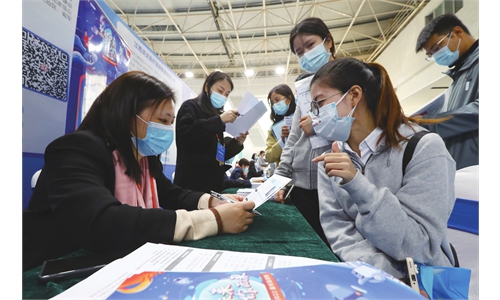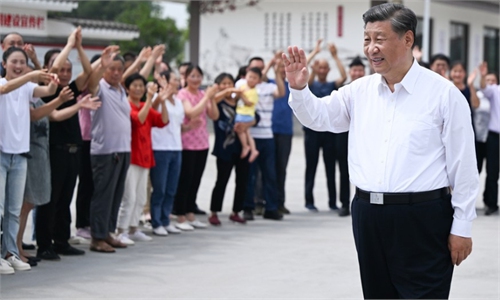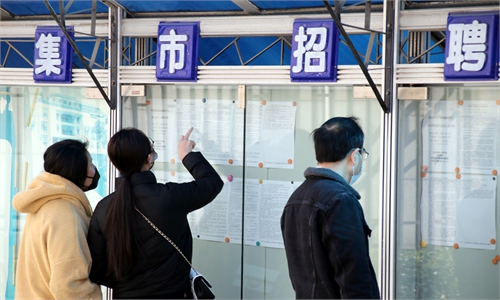China’s labor market improves in May; new measures to tackle youth unemployment
New efforts to tackle youth unemployment
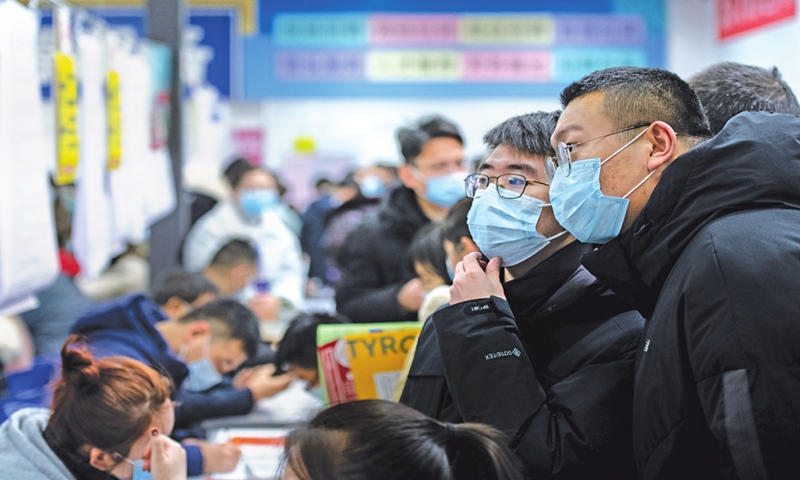
Two college graduates read a job description at a recruitment fair held in Taiyuan, North China's Shanxi Province on February 8, 2022. Photo:cnsphoto
China's labor market has shown an overall improvement, with the surveyed urban unemployment rate dropped slightly to 5.9 percent in May, thanks to the swift recovery of economic and social activities as well as a series of stabilization measures, according to official data on Wednesday.
Still, as the youth jobless rate continues to climb to a record high, the government is beefing up measures, including subsidies and guaranteed loans for smaller firms, as well as releasing a new batch of 18 professions to create more jobs for college graduates and boost entrepreneurship.
China's surveyed urban unemployment rate stood at 5.9 percent in May, down 0.2 percentage points from April. A total of 5.29 million new urban jobs were created in the first five months, data from the National Bureau of Statistics showed on Wednesday.
In May, the surveyed urban unemployment rate among those aged 25-59, the majority of the labor market, stood at 5.1 percent. However, the jobless rate among those aged 16-24, a group that includes new college graduates, hit a record high of 18.4 percent.
"The unemployment for this group is a little bit higher this year, due to the joint effect of a surge in the number of graduates and fewer job opportunities amid the epidemic," Mao Yufei, an associate professor at the Capital University of Economics and Business, told the Global Times on Wednesday.
However, seasonal factors may have also contributed to the rise in unemployment for young people over the past two months. The unemployment rate for this group usually rises between March and July as graduates who have not yet landed a job are classified as unemployed instead of being outside of the labor force, leading to an increase in the unemployment rate, Mao said.
Overall, China's jobless rate remains relatively low compared with some Western economies like the EU, as the Chinese government's ramped-up efforts to stabilize the employment market and Chinese people's high savings rate mean that the short-term jump in the youth jobless rate is unlikely to add much pressure to the economy, Zhang Yi, CEO of iiMedia Research Institute, told the Global Times.
With a record 10.76 million new graduates from universities and colleges this year, the State Council, the country's cabinet, announced a raft of support policies in May to help young people, especially college graduates find jobs and set up businesses.
For example, micro-sized, small and medium-sized enterprises - which create over 80 percent of urban jobs - will get social insurance subsidies, guaranteed loans, interest-rate discounts, and tax and fee reductions if they hire more graduates.
The country's booming platform economy is also encouraged to play a more significant role in creating jobs, while state-owned enterprises will also recruit more.
The central government will set aside 61.76 billion yuan ($9.68 billion) for employment subsidies this year amid efforts to ensure employment, while it is stepping up efforts to help pandemic-affected sectors, including aviation, catering and tourism overcome difficulties. It is also widening employment channels and harnessing the role of business start-ups in boosting employment.
In the latest move, the Ministry of Human Resources and Social Security said on Tuesday that it is considering the addition of 18 new professions to reflect the country's occupational development and boost employment and entrepreneurship of graduates.
Local governments have also taken various measures to support jobs creation. For example, Wuhan, capital of Central China's Hubei Province, announced that it would grant a subsidy of 1,000 yuan to micro-sized, small and medium-sized enterprises that hire fresh graduates and sign contracts with them for over a year and make social insurance payments, with another 1,000 yuan given to the graduates.
Luo Tianwen, an employee of the Human Resources and Social Security Bureau of Lanzhou, told the Global Times that college and university students receive training in such areas as entrepreneurship, e-commerce and tea ceremonies starting with their first year to ensure they can be employed after graduation.
"For example, if a graduate who has obtained a law degree can't get a job, he or she will have to receive such training so as to get employed first and then choose law-related occupations as opportunities arise," Luo said.
Zhang said that the country's unemployment pressure will likely ease in the second half of 2022, with expectations that the battered services sector will gradually revive, driven by strong economic recovery momentum.
Flexible employment in sectors, including e-commerce, livestreaming and logistics, could be further expanded to provide more jobs for young people, according to Zhang.
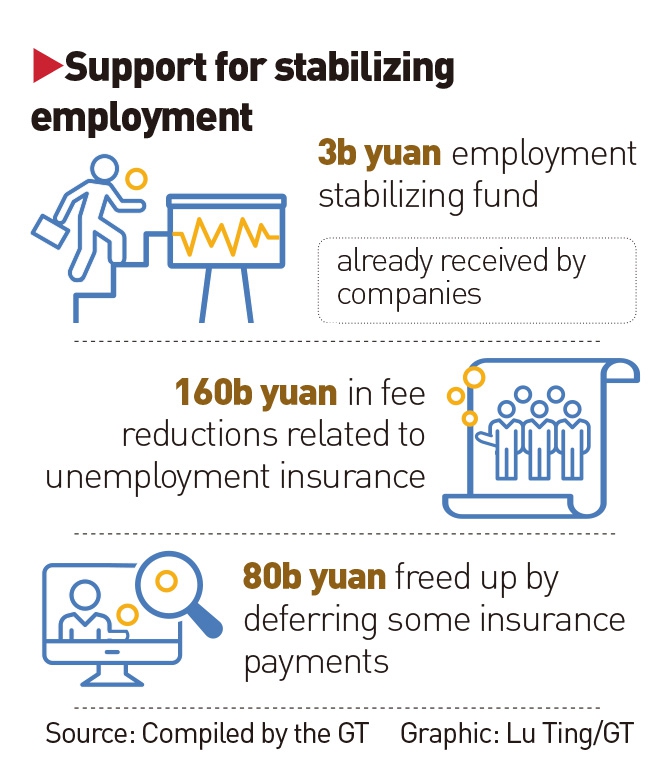
Graphic: GT
